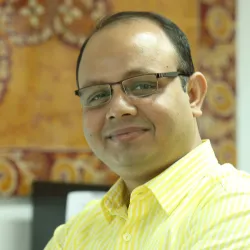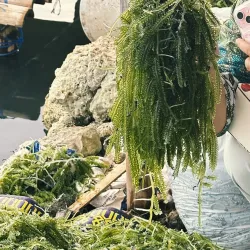Sea grapes: a key ingredient in diabetes prevention and improving farmer livelihoods?
Sea grapes are considered a diet staple by some, and a ‘super food’ by others. But what if they could be more than just a meal?
Existing studies show that sea grape (Caulerpa racemosa) extracts can reduce blood glucose levels in mice and rats, and Dr Haribondhu Sarma, public health researcher from the National Centre for Epidemiology and Population Health, wants to find out if it will work in humans, too.
Together with colleagues from the ANU, Universitas Airlangga Indonesia, University of New South Wales, Canberra and other partner organisations, the team has been awarded $498K by the Knowledge Partnership Platform Australia-Indonesia (KONESKI) to investigate this.
“We are building on existing Indonesian innovation – our colleagues at Universitas Airlangga have already patented the sea grape extract technology,” says Sarma.

“Our next step is to refine the formulation of nanoliposome, which is a type of drug delivery system using microscopic lipid sacs, and conduct an early-stage clinical trial in Indonesia. If we see strong results, we’ll progress to a large-scale, multi-site trial.”
Researchers hope this sea grape-based supplement will offer a safer, and more affordable option than existing medicines. Given that three-quarters of the world’s 537 million people living with diabetes are in low- and middle-income countries, Sarma says affordability is just as important as effectiveness.
The project goes beyond examining pharmaceutical benefits. The researchers have a holistic vision for the lifecycle of the supplement product, and hope that local sea grape farmers and community will benefit from the increased demand for this product.
“Sea grape farmers are often marginalised in Indonesia. If this product reaches the market—as has happened in places like California—it could transform livelihoods in these coastal areas,” says Sarma.
Sea grape farmers are open to this development, with one farmer saying:
“We need support and encouragement from institutions to open new market opportunities for sea grapes. The current market price is low—around AUD $2 per kilogram—and this affects our motivation to keep cultivating them. If this project succeeds, it could raise our income and secure our future.”

The researchers plan to work closely with the Ministry of Marine Affairs and Fisheries to establish regulations that ensure that sea grapes are harvested in a sustainable way.
Professor Reto Widyowati, project lead from the Department of Pharmaceutical Sciences at Universitas Airlangga Indonesia, says that this project exemplifies the power of international partnerships in science.
“By combining expertise in health resilience and marine biodiversity, and harnessing the potential of nanoliposome technology from Indonesia’s rich sea grapes, this research opens a new frontier in sustainable and innovative diabetes treatment,” she says.
“It is a remarkable step toward a healthier future powered by nature and strengthened by global cooperation…This research not only reflects our shared commitment to health resilience and marine sustainability, but also represents a dream come true – to turn Indonesia’s natural marine treasures into innovative solutions for global health.”
From the lab to coastal villages, researchers are excited to see where this project will lead.
